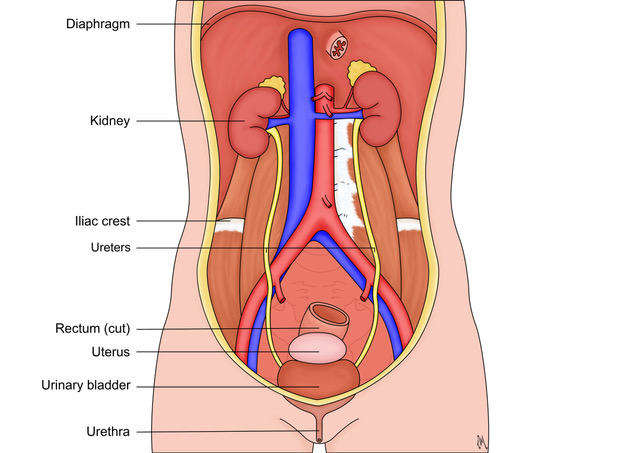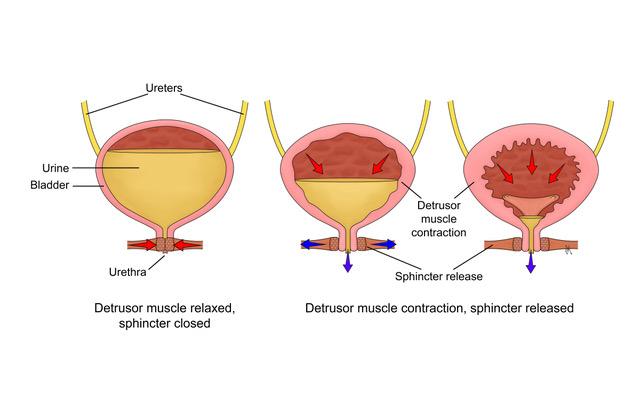Healthy Bladder
Explanation of common symptoms/ problems
This page will give you information about how the bladder normally works when you have no identified reasons for experiencing a problem with your bladder.
The bladder stays healthy by continually filling and emptying. Your bladder is a storage organ, it gradually fills many times during the day. The pelvic floor muscles contract and the bladder sphincter keeps the bladder tube (urethra) closed so urine is stored. You may first recognise you need to go to the toilet when it is holding approximately 150 millilitres, but we often ignore these first signs. Generally, people visit the toilet to pass urine when it is convenient and the bladder is holding approximately 400mls urine. If we are drinking regularly, we visit the toilet between 5-8 times a day.
When we are at the toilet to pass urine the bladder contracts, the pelvic floor muscles and the bladder sphincter relaxes to allow the passage of urine. There should be a good flow, a feeling of complete empty and no dribbling after you have left the toilet.
As you age you may find it more difficult to hold your urine and you may need to get up more at night, also you may notice some urinary leakage. It is important to keep your bladder, pelvic floor muscles and urinary system healthy and working properly to avoid further problems and urinary tract infections.
Things that affect bladder health
-Toilet facilities
Sometimes due to work environments we can’t visit the toilet as regularly as we would like or it is difficult to access toilets. It is important that we have good toileting facilities where we are able to sit relax and clean ourselves appropriately. Hovering above a dirty toilet is not a good way to pass urine.
-Fluid intake
People may not drink well or can change their fluid habits if they change jobs or have noticed some urinary leakage. It is helpful to drink at least 6 to 8 large mugs of fluid per day (approximately one and a half litres to 2 litres). Drinking more fluid than this means your bladder fills more quickly and you may then need to pass urine more often. Drinking less fluid makes the urine concentrated (dark coloured urine) this can affect the bladder giving symptoms of:-
- frequency, which is needing to go to the toilet more regularly
- nocturia, needing to get up to the toilet more than once at night
- urgency, needing to rush to the toilet and finding it difficult to ‘hold on’
Drinks that stimulate the bladder nerves (these include blackcurrant juice, tea, coffee, green teas, fizzy drinks, also chocolate and alcohol) can increase the bladders sensitivity and cause the symptoms above including urge leakage. It is best to regularly drink clear fluids or milk. Cranberry juice has often been thought to help the bladder but there is low research evidence for this.
-Bowels
The bowels influence the bladder due to how close they are within the pelvis. Constipation can cause pressure making it difficult to pass urine or causes urinary leakage. Also repeatedly straining to empty the bowels causes pelvic floor muscle weakness. Therefore, soft stools that are easy to pass helps the bladder work more efficiently.
-Bladder empty
You may find at times it is difficult to empty your bladder. You maybe straining to empty or dribbling urine after you have walked away from the toilet or you may need to return to the toilet soon after leaving it to pass urine again.
There are a few reasons why this may be happening. This can happen if you have not emptied your bowels; you may have been stressed or have been holding too long therefore the pelvic floor muscles find it difficult to relax. Not fully emptying your bladder regularly may cause a urine infection. If this is happening regularly it’s important to discuss with your GP.
-Urine infections
There are many different symptoms of a urine infection. In general, it is important to look out for changes in how often you pass urine; a change in sensation when passing or feeling unwell. Some of the symptoms may include:
- Having to pass urine more frequently and/or more urgently
- a constant dampness or ‘drip’ leakage; slow flow or difficulty emptying the bladder
- A burning sensation in the bladder or the bladder tube (urethra), when you pass urine
- A feeling of not emptying your bladder completely
- Pain in your tummy either low down in the pubic area (bladder) or higher up on the sides or back (kidney)
- Tenderness just above the level of your pubic hair
- Feeling generally unwell
- High temperature (fever, temperature above 37.9 degrees)
- Shivering (episode of shaking or shivering which can occur with a high fever)
- Cloudy, “dirty” or smelly urine
- Visible blood in the urine (Haematuria)
If you are unable to pass urine; have pain or burning when passing urine; notice blood in the urine or if you are concerned that you have a urinary infection it is best to contact your GP or visit an urgent treatment centre as soon as possible.
NB men should also see their GP if they experience erectile dysfunction or notice any changes in the shape or size of the testicles
Self-help / Advice
To keep your bladder healthy, it is important to drink well, visit the toilet regularly and empty your bladder fully. Sometimes medication that we take can influence this, for example taking pain killers. If taking a medication affects your bladder discuss with your GP.
-Fluid advice
- Many people with bladder problems manage this by drinking less. This causes concentrated urine and constipation which can irritate the bladder further.
- Make sure you are drinking regularly during the day; one and a half to two litres of clear fluid are advised.
- Avoid having too many drinks containing alcohol or caffeine, especially before bed.
- Other bladder irritants are cigarette smoking.
-Managing bladder empty
- If you have problems with emptying your bladder, going to the toilet more does not make it work more efficiently.
- Always take time to empty your bladder fully, sit on the toilet take some deep breaths and relax.
- It is advisable to empty your bladder regularly, approximately every 3 – 4 hours.
- Take care with sitting too long, if we don’t move about sometimes, we don’t realise that we need to visit the toilet.
- If you sometimes dribble urine after moving away from the toilet, lean forward and rock back and forth three times before you stand, you may be able to pass any urine that has not completely cleared.
-Hygiene
- Women only: after passing urine or stool, remember to wipe from front to back.
- Using a personal lubricant during sexual intercourse that is water based and does not have parabens can help.
- To reduce the risk of developing urinary tract infections, pass urine after sexual intercourse, then wash your perineum with water and pat dry.
- Avoid using products with fragrances when bathing, as these products can irritate the vulva and urinary system.
Remember to always wash your hands after going to the toilet.
-Managing bladder urgency
If you experience urgency there is often a desire to clench your legs together or rush to the toilet. It is often better to relax and after the initial strong sensation of urgency has passed, walk to the toilet at your normal pace. Sometimes distracting yourself by counting can help (see urge incontinence)
-Managing Urinary Leakage
Many people limit fluids and visit the toilet more frequently if they are experiencing urinary leakage. Pelvic floor muscle exercises can significantly help with urinary leakage (see stress incontinence
-Managing your bowels
Stools should be soft and easy to pass and you should not feel a need to strain.
You can improve your bowel pattern by:-
- Regular fluids
- Increasing the soluble fibre in your diet. The healthy eating “Eatwell Guide” can help you to understand the different types of food that make up a healthy balanced diet. Read: https://www.bda.uk.com/foodfacts/healthy_eating
- Regular exercise, such as a brisk walk every day
- Only visit the toilet when you have the urge and do not delaying for long periods of time.
- It is important to relax your pelvic floor muscles when passing a stool, always sit and never ‘hover’, also avoid straining and pushing. We advise you to sit on the toilet with your feet on a low stool, leaning forward, breathing deeply and relaxing the abdominal and pelvic muscles, rather than straining.

If constipation is difficult to manage and nothing works even when you do everything right, it is important to talk to your doctor.
Where to go to next
Useful Websites:
What to expect from physiotherapy
Your POGP physiotherapist will be able to give you advice on bladder health.
More information
Location of the bladder in the abdomen

How the bladder fills and empties with sphincter relaxation and closure
